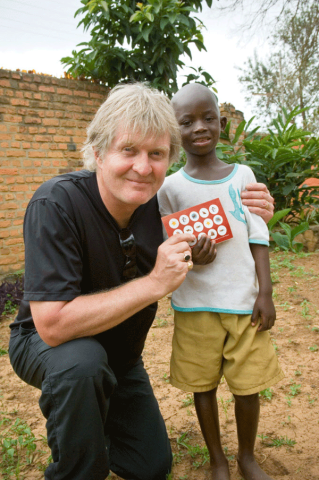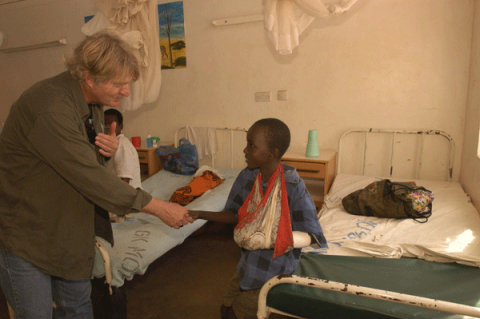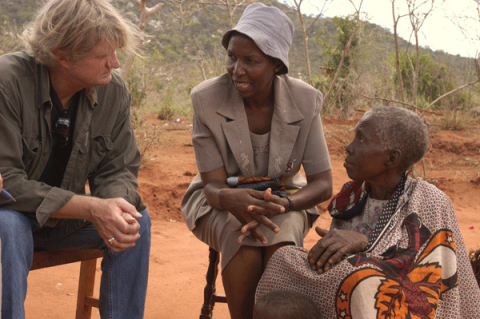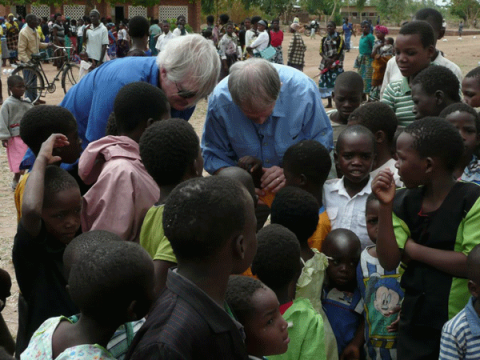
“We met a girl named Louisa who had a big growth on her neck, and a doctor was trying to get her some help so she could be operated on,” the iconic musician, who receives the Allan Waters Humanitarian Award at the JUNO Awards in Regina on April 21, told Samaritanmag.
“She saw all seven people in her family hacked to death by machetes, and they always leave one witness, so the witness would tell about the terror and scare everybody else.
“I wrote about Louisa on the last record No Stranger, a song called ‘The Party’s Not Over’: ‘Hey Louisa, are you still sitting there, an angel in the dirt in the middle of Changara, I sure hope you could have rose from that place, sometimes I see you with a smile on your face.’ “
Louisa is only one of the memories of Cochrane’s forays into Africa and Asia on behalf of World Vision, and World Vision is only one of the many charities and humanitarian causes to which the officer of the Order of Canada recipient has devoted his time.
The seven-time JUNO Award winner and Canadian Music Hall Of Fame member, best known for such smash hits as “Life Is A Highway,” “Lunatic Fringe,” “Big League,” “Boy Inside The Man” and many others, as well as one of the few Canadians to sell 1 million albums in his home territory (1991’s Mad Mad World), has generously devoted his time to Make Poverty History, Amnesty International and The World Society for the Protection Of Animals.
He donated his talents as part of the chorus for 1985’s groundbreaking “Tears Are Not Enough” — Canada’s contribution to raising funds for Ethiopian famine relief — and served as a consultant and contributor to Young Artists For Haiti’s “Wavin’ Flag” to benefit victims of Haiti’s 2010 earthquake. He spearheaded 2005’s Canada For Asia benefit to help those affected by the 2004 Indian Ocean earthquake and tsunami that killed 230,000 people in 14 countries, and also opened 2005’s Live 8 in Canada, the multi-nation sequel to 1985’s Live Aid.
Cochrane has also performed a number of fundraisers in support of Lou Gehrig’s disease (a.k.a ALS - amyotrophic lateral sclerosis); was the Honorary Chairman of the Parkinson Superwalk; is organizing an upcoming gala to assist Toronto Western Hospital’s Movement Disorders Center and donated the profits from his single “Just Like Ali” to Parkinson’s research. He also continues to support numerous initiatives of the United Way.
So it’s really no surprise that Cochrane is a prime candidate to receive the Allan Waters Humanitarian Award, just the latest in a mantle full of accolades that include The Queen’s Diamond Jubilee Medal, induction into Canada’s Walk Of Fame and the Canadian Music Industry Humanitarian Award among others.
“It’s an honour,” he says of the upcoming presentation. “It’s wonderful that CARAS and the JUNO people — and the Allan Waters Foundation — put this together because I do think it’s nice that the music industry emphasizes the human element and the charity element, and the part of the music business and the art and the artist that are tuned into the world.”
Cochrane, currently working on his 14th studio album (a total that includes seven with Red Rider), took some time recently to talk to Samaritanmag about some of his charity work.

“I’ve been to Africa a bunch, and a few times to Asia, with World Vision. You know, these things kind of pick us. We choose to acknowledge it or we don’t. To be honest with you, as an artist, with my profile, you’re approached and you say ‘no’ a lot more than you say ‘yes’ because you just can’t do everything.
“World Vision, we took on a sponsor child back in the mid’80s, right around the time of ‘Tears Are Not Enough.’ I thought, ‘It’s good to pay lip service to this, do this song. It stimulated more interest — although if you go back to ‘White Hot’ [from 1980’s Red Rider album Don’t Fight It] I’ve always had an interest in the world at large and the struggles people go through. I mean, that’s what we are as songwriters: we talk about struggles on all levels, right? Those are the things that galvanize us, make us stronger, make us grow, and make us pay attention.
“So long story short, we sponsored this child from Ecuador, and World Vision actually came back to us and said, ‘Well, we don’t think the money’s being spent properly. We want to change the child you’re going to sponsor.’ And I really admired their honesty and their integrity, first and foremost.
“A little while later, an old buddy of mine, Skip Prokop [drummer of The Paupers and Lighthouse co-founder], who is a born again Christian, approached me to do this 24-hour Famine radio-a-thon. We did it at a small Brampton radio station. It was a fledgling fundraiser at that point and then it burgeoned into the 30-Hour Famine. A lot of schools would do it: everybody would sequester themselves in the school gymnasium for 30 hours and they’d get pledges to raise money. Initially I got involved with that, and then MuchMusic VJ Terry David Mulligan mentioned to me, at some function, ‘Would you like to go to Africa with World Vision?’ We found a window and we did a whole series of shows with MuchMusic.
“I just loved the organization. At first, I was like, ‘Look, I’m not going to be a shill of the organization, I’m going to call it as I see it, as long as you guys understand that when we go over to Africa, then we’re good to go.’ The more I saw and the more I went through with them, it just galvanized my resolve in the organization, how they conduct themselves, just how much good they do, how well the money is spent and how much of the money goes to where it’s supposed to go.
“I forged a lot of relationships and good friendships with people over the years. (World Vision Canada President & CEO) Dave Toycen is my mentor and he’s one of my dear friends. There’s nobody who does more for people than Dave, and even though he’s a real galvanized religious fellow, he can talk to people about almost any subject. He doesn’t make people feel alienated. I’ve never seen anybody quite like him. He’s quite the individual. So we’re close friends and we’ve been on quite a few of these trips – maybe five, together, including Asia trips.”
When was the first time you went to Africa and what was your impression?
“It was ’89, early December. Words cannot describe the emotions I went through. I almost think that after that trip — specifically the one to Somalia a few years later — I came back and I had a mild case of post trauma stress disorder, if you can have a mild case of that. Because I remember I was on The Dini Petty Show and I tried to speak, and I couldn’t. I could not speak. I lost my breath and I thought they were going to have to put me on oxygen because I couldn’t breathe.

“I remember we walked into one of the wet feeding tents, and this girl, probably 14 or 15, looked up at me, as her Mom took her last breaths and did the death rattle. She looked up at me, and it was that experience where I saw my kids in her eyes; it was that transference. She looked at us, like, why didn’t we do something? What are you doing here? What are you doing here with your pencils and your cameras and my mother just died? I walked out of that tent just overwhelmed, and that was really powerful experience.
“I’ve always been moved, every time I’ve gone over. Sometimes for different reasons – Sri Lanka was a different reason. We stopped to see the power of the tsunami and what it had done. We wanted to witness some of the work that had been done with the money we had raised for Canada For Asia although we didn’t raise the money we had hoped – we had hoped for the $12-$13 million area, but we were in the $4-$5 million area – but it was the gesture.
“When I talked to (Canadian politician, diplomat and humanitarian) Stephen Lewis a number of years ago, he said he was never a supporter of faith-based organizations, but he said, ‘I have nothing but good things to say about World Vision.’ He was the envoy to AIDS in Africa and he said, ‘Everywhere I’ve gone, they’re there, and people trust them.’
“Being a Christian organization, we’ve been to places like Mauritania, that were really extremely diehard reactionary Muslim countries, and they trusted World Vision. It was amazing to see how effective they were in some of those areas, because they prove their faith through their work, and that’s an important thing. If that galvanizes people and gives them a purpose to move forward and to subordinate their egos, then that’s what’s important to me, in getting that work done, and they testify through their work. That’s not the old vision we have of missionaries, where it’s bibles-for-food, and that they’re sort of above the unwashed masses in a sense. You know what I mean? They get right in there with the people and they prove who they are through their work, and that’s a wonderful thing.”
You’ve been involved in a lot of organizations for a lot of fundraisers — Make Poverty History, Greenpeace, Society for the Protection of Animals — is there a common thread that’s important to you?
“The common thread is that if people can eat, and they can support themselves with dignity, they’re happy. If they’re healthy, and they can eat, and they’ve got potable water, people are happy. Those are things that people should be entitled to. It’s a pretty broad issue, but it’s important.
“There’s some very complex issues of global warming and all that, which has affected the Sahil (a Somalia region in Somaliland) and has expanded the desert in Africa, for instance, and that’s been happening for quite awhile. These droughts aren’t coincidences, and you can get into that — but people can drink if they’ve got water; and they can feed their children and their families, and they have dignity. That’s very important.

“It’s just that women are the bottom of the totem pole. They’re the ones that are treated the worst around the world. If women were more empowered, we’d have a better world. To be perfectly honest with you that’s one of the biggest issues – the empowerment of women. You’d start to see that in certain countries, but women are basically treated like dirt. They don’t have a lot of rights -- and that’s starting to change. World Vision is extremely aggressive in that area – about promoting that kind of change and the empowerment of women – the respect of women and the family unit. It’s a complex issue, man, but it’s an important issue.”
Did your parents instill some of these values in you, or did it come as an adult when you were a working musician and songwriter?
“My folks were good folks. I was very privileged and had a good upbringing, and Canada supplied that. I was born in Lynn Lake, Manitoba. I didn’t live there very long, but I’m a believer that those first four or five years – and a lot of psychologists believe that -- are the formative years. So until I was 4, we lived up in Lynn Lake, Manitoba. There was no TV. It was the early ‘50s, so TV was new. The community counted on each other for everything. You didn’t worry about security going outside; it was like one big extended family.
“My Dad was one of the only ways in and out of there because he was a bush pilot. He’d fly supplies in and out to trappers and miners out in outlying areas, so he was kind of the lifeline for the community. It was a very distinct community with everybody pulling together and there was a lot of love, affection and that pioneer spirit that you might find in places like that. My folks were good people. I think they imprinted some pretty good values on me.”
When did you have more world awareness?
“I’ve always had it to tell you the truth. When I was a kid, I had some rather odd heroes – [American broadcast journalists] Edward R. Murrow, Walter Cronkite…[Canadian broadcast journalist] Peter Jennings, later. I wanted to be a correspondent. That’s what I really wanted to be. Then I got into [Bob] Dylan, and I just realized there was a broader canvas to be painted on than music.
“Music was a happenstance — something I kind of fell into more than anything — but I did realize that that’s why sometimes I think of what I do, maybe to make myself feel better, as sonic journalism. I tell stories. About 60 percent of my stuff are the stories I’ve heard and things that I’ve observed and read. Hopefully you can transfer your experiences on that. Some of it’s autobiographical
“I was also always fascinated by history in school, amazed by things like the Holocaust and how people could do those things to each other. It dumbfounded me, and I wrote ‘Lunatic Fringe’ of course, about a kind of fanaticism. It’s one of the things about, but in no small part, about that. So I was always really fascinated about history and what was going on.”
What needs to done to right some of these wrongs?
“The big thing about this is - you just have to touch people along the way. It’s simple. One of the things that gives me the most gratitude..a guy came up to me the other day in Toronto for instance, and he said, ‘you know what? You met my friend some years ago — 10 or 12 years ago, whatever, and you took the time to talk to him and you signed something for him.’ It’s as simple as that, you know. It doesn’t take a lot. Just to be mindful of people and every day just try to be kind to people. That’s where it starts.
‘Toyce [Dave Toycen] talks about that sphere of influence, you know, the rock in the water, the ripples go out and if you’re too caught up in all this other stuff that’s happening, and you try to be too big an influence, then really you’re not an influence at all because you’re too spread out.
“I try to be nice to people. Do the meet-and-greets and talk to people, try to be down to earth. And when I walk the streets of Toronto, people go, ‘Hi Tom, how are you?’ They treat me like cousin Tom, as opposed to some pompous asshole. At the end of the day, hopefully people can say that about me: That he was a good guy. That’s important.
“I’m a public figure. We tend to have a high profile, but I’m a pretty regular guy. And I try to treat people with respect and I think that’s what you have to try to do. And that’s where it starts — the humanitarian.”
What are some of the other things you feel could deserve more attention?
“I think food banks are always important, although sometimes there’s mischief that goes on in those areas. The United Way, with its satellite of funds. We’re doing a gala [Sept. 6 at the Capitol Theatre] for Toronto Western [hospital]. They’ve done some incredible work with Parkinson’s. My Dad had Parkinson’s and he died. So we’re doing that. All those health-based agencies are important. The facility they have up at Parry Sound (The West Parry Sound Health Centre) is second to none and it’s wonderful just how the community has rallied around that hospital.
“I still think we’ve sort of turned our backs a little bit on Aboriginals — that’s disheartening. That’s a topic for another day, but I do think our federal government should pay a bit of attention. We can’t just sweep a lot of those issues under the rug with our Aboriginals. Some of these communities are living in Third World conditions, and you can say that some of them have precipitated the problems themselves, but it’s more complex than that.”
Is that something you plan on possible focusing on in the future?
“Right now, what I’m focusing on is making the best record I can for a 59-year-old man. That’s what I’m focusing on. I’m really into my music right now – just incredibly so. And so that’s what I want to do. I don’t get up every day and go, ‘okay, this is the cause I’m going to go after. ‘A lot of that stuff comes to me, so it’s a matter of picking and choosing and deciding what you can do, and what is viable. What makes sense – you know what I mean? There’s enough stuff that needs attention that’s out there, that’s for sure. It’s good to see – there are a lot of organizations that could use the help."
30 Teddy Bear Coat Outfits to Brave the Cold in Style